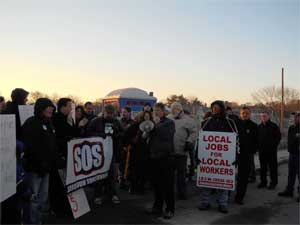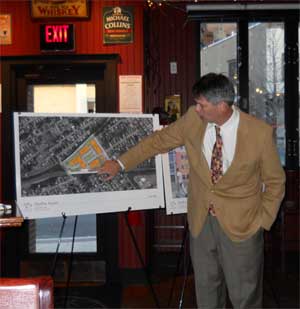
A crowd of around 70 people, representing various unions and community organizations, gathered beginning at 6 am on Clyde Street at the site of a new residential development by KSS Realty and GFC Development to urge the developers to enter into a Project Labor Agreement with unions and to hire local, union workers for the project.- Photo by Ashley Taylor
Labor groups want local employment at condo construction site
By Ashley Taylor
Before the sun rose on Thursday, union painters, plumbers, electricians and bricklayers, had already gone to work at the construction site of a new apartment complex at the former MaxPac industrial site on Clyde Street.
They were working not for pay but for the promise of securing local, union jobs on the construction of the 199-unit luxury condominium building.
About 70 union members and supporters congregated at the construction site, many carrying signs that read “Local Jobs For Local Workers,” demanding that the developers, KSS Realty Partners Inc. and Gate Residential Properties, LLC, enter into a project labor agreement with unions to guarantee that the project’s jobs go to local, union workers.
The rally, which began at 6 a.m. and broke up around 8 a.m., was a cry of discontent from local people who are out of work and afraid that without a project labor agreement, jobs at this construction project may go to someone else. The picketers included not only union members but also community groups, like Save Our Somerville and Somerville Community Corporation, which work to advocate for affordable housing in Somerville.
“We want jobs for local people,” said Donald Sheehan, business representative for the International Brotherhood of Electrical Workers, at the rally. “We’re here, we’re unemployed, we’ve run out of unemployment, and a lot of these jobs that are here, they’re going to people from out of town, out of state: they’re not spending their revenue here. People we have, they live in the community, they earn their wages here, and they’ll shop in this area and turn their money back to the community.”
As part of the process through which the city approved the development, the city and the developer, KSS, signed a special covenant, which included a recommendation that the developer use union labor on the project. The covenant states that, “The City encourages the Developer to use union labor for the project and to entire into a project labor agreement,” or commitment to exclusively use union workers for the project.
Thomas McIntyre, a leader at the rally and representative of the bricklayers’ union, said the covenant obligates the developers to enter into a project labor agreement: “The Board of Aldermen of the City of Somerville unanimously voted to include language in the covenant between the developer and the city to work with the unions and to work toward a project labor agreement. I didn’t suggest that, nobody here suggested that, the elected officials of Somerville said that, and so Mr. Tobin [Ted Tobin, of KSS] has to adhere to that provision.”
McIntyre believes that without a project labor agreement, union workers and local workers will be excluded from the project. “It’s just not the way the industry works. Subcontractors don’t just come into a job site and look for local hires; they just don’t do that. The union has relationships with the people of Somerville. There’s a system in place to refer those people to the job,” he said.

Ted Tobin, of KSS Realty, refers to a plan of the 184-unit apartment complex at a press conference. ~Photo by Ashley Taylor
Tobin, of KSS, reads the covenant as encouragement, but not obligation, to enter into a project labor agreement. Tobin said that the developers are not opposed to unions working on the project, but they are opposed to a project labor agreement, saying “It doesn’t appear that something like that would make a lot of sense.” He says that unions are encouraged to bid on the project, and that KSS “looks forward to some of their participation.” The developers recently met with the Boston Building Trades Council to discuss union participation in the project.
KSS has already hired one union contractor R.S.G, based in Lowell, for the demolition work they have done so far. Non-union contractors also bid on the demolition project, but the Union contractor won in this case.
Tobin said that the goal of KSS is “to have some competition” in bids on the project. Unions in every trade made not win contracts, he said. “It’s a factor of how competitive they can be.”
In one particular project, state law requires the developers to hire the lowest qualified bidder. A Transit Oriented Development grant will help fund the construction of a ramp connecting the development to the Lowell Street bridge and, in the future, the Lowell Street Green Line stop. Under state law, money from that grant can only be used to hire the lowest qualified bidder for the project. Union contractors will be encouraged to bid on the ramp construction, but Tobin emphasized that KSS has no control over who is hired for that portion of the project.
Two aldermen attended the rally to support the picketers, Aldermen At Large Dennis Sullivan, a former union steward, and Ward 5 Alderman Sean O’Donovan, who, since 2004, has organized community meetings to discuss the project.
When asked if the Board of Aldermen can pressure the developers to follow the covenant’s recommendations, Alderman O’Donovan replied, “Legally we cannot force it in the covenant. We cannot make it a requirement in the covenant…But we strongly suggest it in the covenant. We want to see a labor movement, attention to union workers for this type of project, because Somerville’s an urban, blue-collar city, always has been, historically, and there’s still a lot of people with that kind of job living here, and with these economic times and the way unemployment is, people need the work, and we want to keep Somerville jobs for Somerville people.”
McIntyre said in an e-mail that the picketers, “will continue to do what we have to do in order that this developer follow the suggestion of Somerville elected leaders, and sign a project labor agreement with the construction unions. The PLA must include language related to hiring Somerville workers.”













Reader Comments